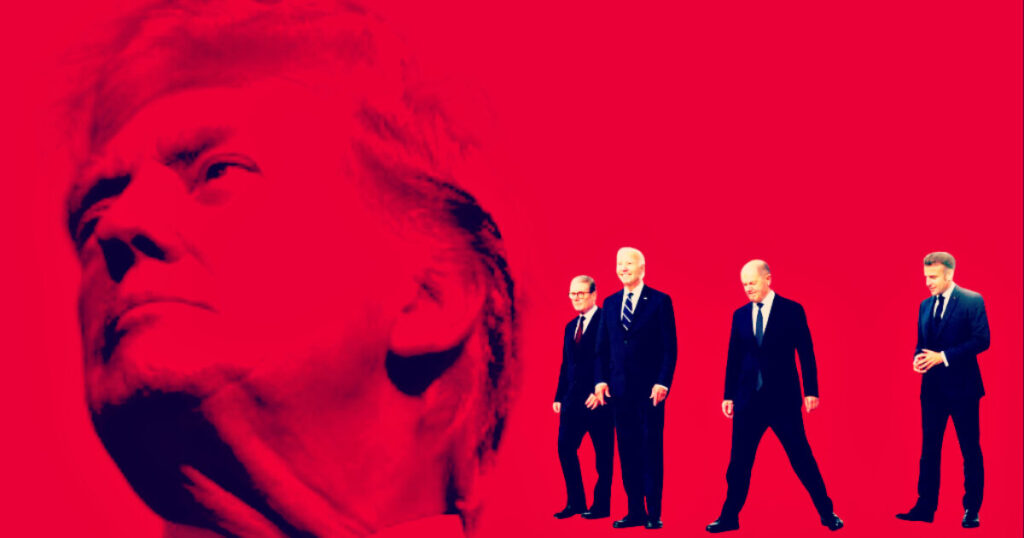On Friday, October 18, leaders from the Quad nations — the United States, United Kingdom, France, and Germany — convened in Berlin amid concerns regarding the potential return of Donald Trump in the upcoming U.S. presidential elections. With only two weeks remaining until voters head to the polls, the specter of Trump loomed over the discussions, creating an atmosphere of uncertainty. While reports focused on the leaders’ disagreements concerning the Ukraine conflict, a more profound apprehension seemed evident. Many observers suggest that Trump’s resurgence represents a significant challenge to what is often termed ‘Globalist’ policies encompassing various issues, including immigration, social policies, and environmental concerns.
During the meeting, U.S. President Joe Biden, UK Prime Minister Keir Starmer, French President Emmanuel Macron, and German Chancellor Olaf Scholz emphasized their unified commitment to supporting Ukraine. However, experts noted that their statements were overshadowed by the unpredictable political landscape in the U.S. Biden and Scholz reinforced the notion of a strong transatlantic alliance, yet skepticism about the future role the U.S. would play in global affairs lingered. The existing tensions and uncertainties surrounding the upcoming electoral outcome highlighted doubts that these discussions could yield concrete plans for sustaining aid to Ukraine in the long haul.
Adele Robinson, a correspondent for Sky News, articulated this sentiment by stating that the potential shift in U.S. leadership, particularly if Trump were to win, could render the Quad’s discussions moot. The visitors from Europe seemed eager to showcase unity in their support for Ukraine, yet the looming question of American leadership cast a long shadow over their efforts. Starmer, when questioned about ‘Trump-proofing’ European defense initiatives, opted to divert the topic, reflecting the leaders’ discomfort with the implications of Trump’s possible return to power. Concerns regarding Trump’s stance on NATO and military support have become persistent issues, complicating European strategies as they seek to bolster their defenses.
The enormity of Trump’s influence extends beyond theoretical discussions; should he reclaim the presidency, it could signal a fundamental realignment of U.S. foreign policy. Observers speculate that the Quad may find themselves in a dramatically altered political landscape, with fresh faces at the negotiating table. One possible scenario could involve a Trump-led coalition featuring figures like Germany’s AfD leader Alice Weidel, Nigel Farage from the UK Reform Party, and Jordan Bardella from France’s National Rally. This shift could significantly reshape the discussions surrounding defense and foreign policy in Europe.
Amid this uncertainty, the potential consequences of dwindling U.S. support raise pressing questions for European leaders. With substantial military aid currently funded by American taxpayers for Ukraine, any change in the willingness of the U.S. to shoulder this financial burden could drastically alter the dynamics in Europe. Trump’s signaling of a more conditional support for allies could transform the traditional American engagement in European defense, leaving the Quad nations scrambling for new strategies to ensure their safety and political objectives. The unpredictable nature of U.S. domestic politics has forced European leaders to confront uncomfortable realities about their reliance on the American military.
As the Quad leaders seek cohesive strategies regarding support for Ukraine and broader global stability, the underlying anxiety created by the potential for a Trump’s electoral victory underscores the fragile nature of geopolitical alliances and collaborations. These conferences may underline a superficial resolve; however, the precarious balance of power and the shifting ambition in Washington compel European nations to question how they will navigate a future potentially led by Trump. The complicated interplay of domestic politics and international relations shapes the Quad’s discussions, revealing a broader narrative of uncertainty and fear over what lies ahead.

